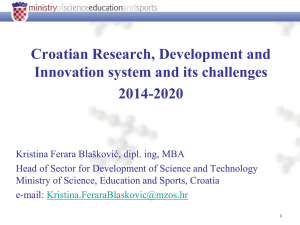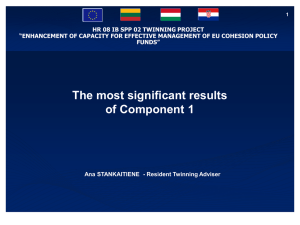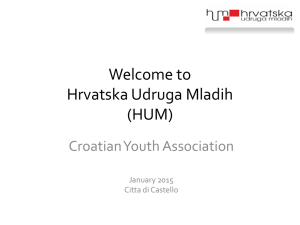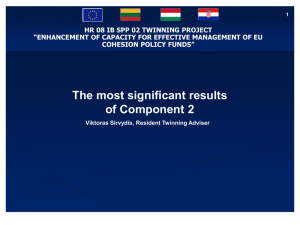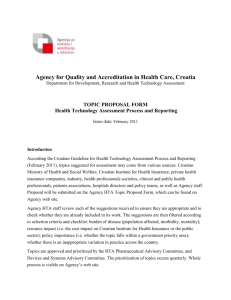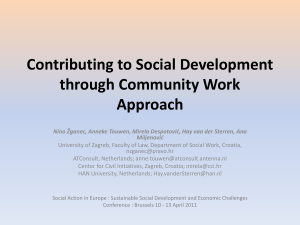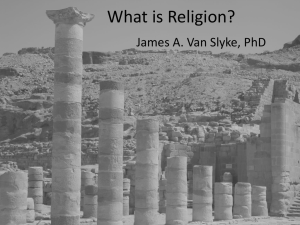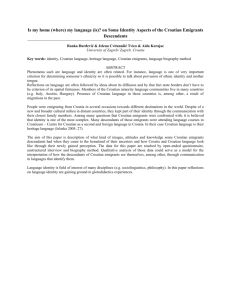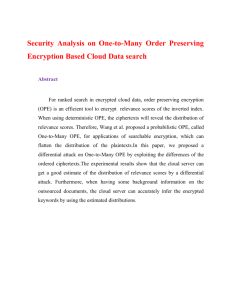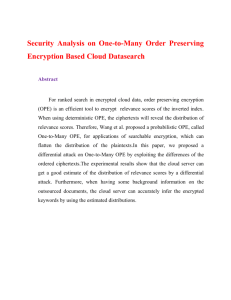Opportunities in Croatian Water- and Waste Management
advertisement
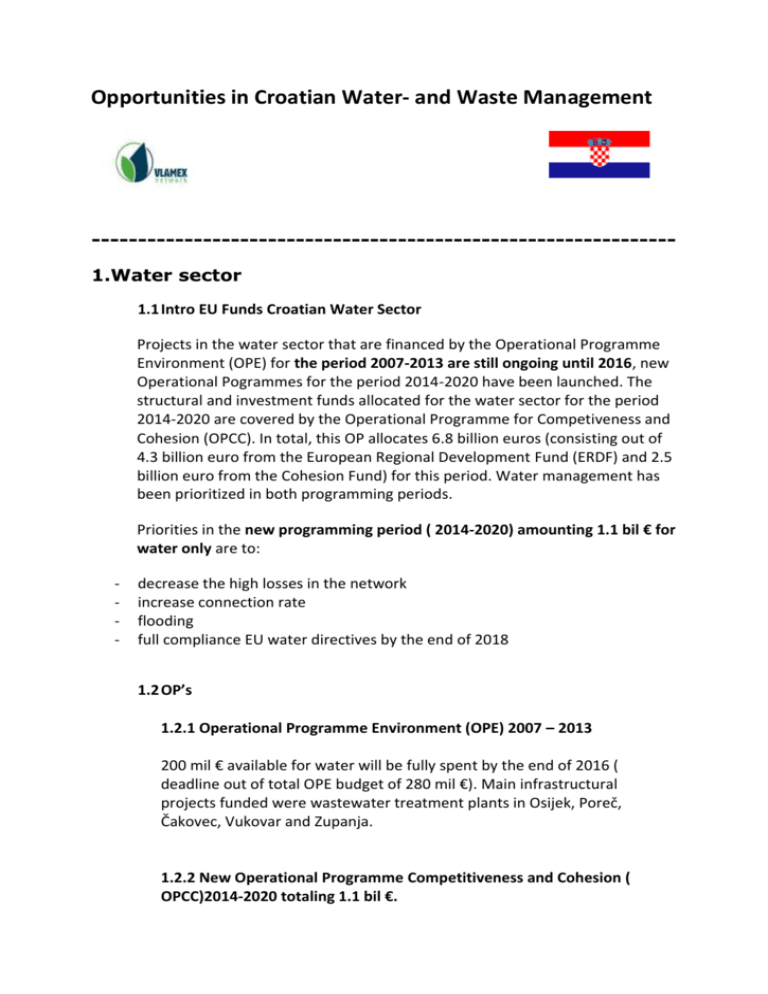
Opportunities in Croatian Water- and Waste Management --------------------------------------------------------------1.Water sector 1.1 Intro EU Funds Croatian Water Sector Projects in the water sector that are financed by the Operational Programme Environment (OPE) for the period 2007-2013 are still ongoing until 2016, new Operational Pogrammes for the period 2014-2020 have been launched. The structural and investment funds allocated for the water sector for the period 2014-2020 are covered by the Operational Programme for Competiveness and Cohesion (OPCC). In total, this OP allocates 6.8 billion euros (consisting out of 4.3 billion euro from the European Regional Development Fund (ERDF) and 2.5 billion euro from the Cohesion Fund) for this period. Water management has been prioritized in both programming periods. Priorities in the new programming period ( 2014-2020) amounting 1.1 bil € for water only are to: - decrease the high losses in the network increase connection rate flooding full compliance EU water directives by the end of 2018 1.2 OP’s 1.2.1 Operational Programme Environment (OPE) 2007 – 2013 200 mil € available for water will be fully spent by the end of 2016 ( deadline out of total OPE budget of 280 mil €). Main infrastructural projects funded were wastewater treatment plants in Osijek, Poreč, Čakovec, Vukovar and Zupanja. 1.2.2 New Operational Programme Competitiveness and Cohesion ( OPCC)2014-2020 totaling 1.1 bil €. For water there are 3 components totaling 1.1 bil €. with focus on: -) wastewater, this is to be achieved by an increased connection rate to the public sewerage systems and an increased amount of waste water treated at an appropriate level of treatment after being collected. Measures include: • (Re)construction and upgrading of the public sewerage system, including supply of equipment for cleaning of network and detection and elimination of leakage and septic tank cleaning vehicles in order to ensure proper operation of sewerage systems. • (Re)construction and upgrading of WWTP’s, small facilities for water treatment and septic tanks, and sludge treatment facilities. • (Re)construction of automatic monitoring stations for water quality and hydrological data, the development of water data analysis and modelling tools, and the supply of necessary equipment and facilities • Implementation of protective measures, such as the construction or reconstruction of sewerage systems, WWTPs, small individual systems and monitoring at zones of water source sanitary protection. -) Supply of drinking water, the OP focusses on the following areas: • Improved public water supply • Construction, reconstruction and upgrading of drinking water supply networks to improve the quality of drinking water and to increase connectivity to the public drinking water supply. • Improvement of water treatment (conditioning) plants and desalination plants. • Investment in the construction of pipelines, plus improved detection and elimination of leakages in order to increase efficiency of water systems -) Floods this is to be achieved by increased planning, prevention and preparatory measures. Currently, the RDP for Croatia for 2014-2020 has been officially submitted but is not yet approved. In total, an estimated 245.4 million euros from the ERDF and 255.2 million euros from the EAFRD will be used “to decrease sensitivity to climate change and improve protection measures”, which includes the management of flood risks. Conclusions water sector =) Public sewerage system is not that developed in Croatia with low connection level (connection rate 44%) in comparison to most of the EU member states. =) Water sector largely fragmented ( 160 public water providers) =)The EU directive on the treatment of urban waste water. Croatia applied for a transitional period up to 2023, with intermediate goals in 2018 and 2020. =) Hrvatske Vode ( Croatian Water) is the responsible state body for the implementation of water management projects and also responsible for the co-financing along with EU and EBRD. 2.Waste sector 2.1 Intro EU Funds Croatian Waste management sector Projects in the waste sector that are financed by the Operational Programme Environment (OPE) for the period 2007-2013 are still ongoing until 2016, new Operational Pogrammes for the period 2014-2020 have been launched. The structural and investment funds allocated for the waste sector for the period 2014-2020 are covered by the Operational Programme for Competiveness and Cohesion (OPCC). Waste management has been prioritized in both programming periods. In total 475mil. € will be available for municipal waste in Croatia over the period 2014-2020. Priorities in the new programming period ( 2014-2020) amounting almost 0.5 bil € for waste only are to: - decrease the share of municipal waste being landfilled to 35% by 2023; establish waste management systems full compliance EU water directives by the end of 2018 2.2 OP’s 1.2.1 Operational Programme Environment (OPE) 2007 – 2013 Projects that arose from the OPE 2007-2013 have to be finished by the end of 2016. Almost 80 mil € available for waste will be fully spent by the end of 2016 ( deadline out of total OPE budget of 280 mil €) Approximately 80 mil € is allocated for: - the construction of new regional and county waste management centers; - the closure and rehabilitation of dumping sites - facilities for the disposal and treatment of waste - capacity building 1.2.2 New Operational Programme Competitiveness and Cohesion ( OPCC) 2014-2020 totaling almost 0.5 bil €. Priorities will go out to the development of 13 waste management centers in Croatia since the government is obliged to construct the planned waste management centres and refurbish existing landfill by 31 December 2018. Conclusions waste sector =) A lack of local expertise with regard to the closure/rehabilitation of around 150 existing illegal dumping sites (need to comply to EU standards) =) Significant investments in the waste sector are needed to meet the required EU environmental standards, in particular with regard to solid waste. =) EU Landfill Directive: Croatia needs to comply with the directive by the end of 2018. =) FZOEU ( The environmental protection and energy efficiency fund )is the responsible state body for the implementation of waste management projects and also responsible for the co-financing along with EU and EBRD. Wim Van Rompay, Liason Officer Vlamex, November 2015
